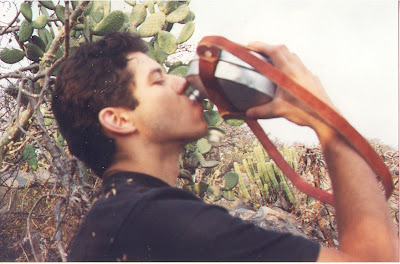Have you ever wanted to travel back in time and change a key event? I have, quite a few times… I mean: I have wanted to do it, quite a few times.
The first time I visited
A couple of months ago I was watching a documentary about the book "Guns, Germs and Steel", which provides an anthropological explanation for Caucasian race's monopoly on world's power. An explanation that makes a lot of sense: showing the circumstances that enabled white man's colonization of the
Very logical, but not less painful.
The documentary dramatized the assassination of Inca's emperor, the brutal butchering of the very same people who created
My fantasy, thus, was to walk into Atahualpa’s court, tell him about the cruelty, the diseases. But also the science, the science at the other side of the ocean. I could have steer all the continent’s cultures into a powerful league: Incas, Aztec, Maya, Tolteca, Olmeca and Tlaxcatlecas. I would have illustrated the doom awaiting those who took the side of the Spanish: they would suffer slavery for centuries, perhaps millennia. Because of the color of their skin, the shape of their nose, rewarded only with a handful of presents from their soon to be slave drivers. The conquerors gave the ‘new’ world a taste, not just a metaphor, of the apocalypse they brought along with their Bible.
I could have helped their states grow and adopt the science of the west, promote literacy, ecological sustainability, foster an alternative culture, an option to the monolithic power of European countries in the world. A world with a strong, rich culture, unique roots, completely different, totally American.
And then, a few weeks ago I was walking on the Avenue of the Dead in Teotihuacan, just north of Mexico City, I was mentally editing my master plan for XV century Tenochtitlan, polishing subtle points such as intercontinental trade, state vs. private owned industries, and foreign investment. Lord Tonatiuh was shinning bright in the middle of the sky as I walked by his pyramid, leaving behind me the temple of the Moon… it was right then, right there, with such witnesses that I realized that my utopia was race based.
The conquerors were brutal and diabolical not because they were Spanish, but because they were ignorant and powerful. The state I was dreaming of would be utopian not because it would be formed by the likes of Moctezuma and Atahualpa, but because the ideas that would shape them (ideas with the benefit of five centuries experience). The massacre and slavery of the American cultures was a catastrophe because it was an extreme case of abuse of the powerful over the powerless, an extreme case of cultural devastation, not because victim’s blood was my own.
So, what exactly would it change if I could travel back in time, one step ahead of the genocide?
Perhaps today we would see the same universal difference between haves and not haves. Same story, different characters. Perhaps time and power would have made the Aztecs as corrupt as the Spanish were. If such was the case: what would have been gained? What difference does it make if the richest person on the world is the white geek Bill Gates or the complex Mexican with Syrian background Carlos Slim? Does it make a difference to the millions condemned to poor education and poor health care due to the corruption and inefficiency of their statesman? When hundreds of millions are systemically doomed to misery generation after generation, it doesn’t really matter if they are white, maya or black.
If the point is to be in a time and place where you can help avoiding great suffering, then there is no need to go back in time. Construction of utopia can start from so many places when ‘we’ becomes a vastly populated word.
So maybe I could use my ticket to the world than once was to visit the sixties, after all. How would you like to hear Strawberry Fields Forever with a Mexican accent? Oh, well… in some other page I may discuss a couple of characters from the past that I would love to meet. One is Jesus Christ, influential guy to say the least. But more than him, I would give anything to be able to look into the eyes of the man or woman who, dozens of thousands years ago, was the first person to realize that there is such a thing called “time”. The very first one to think about Chronos.

No hay comentarios.:
Publicar un comentario